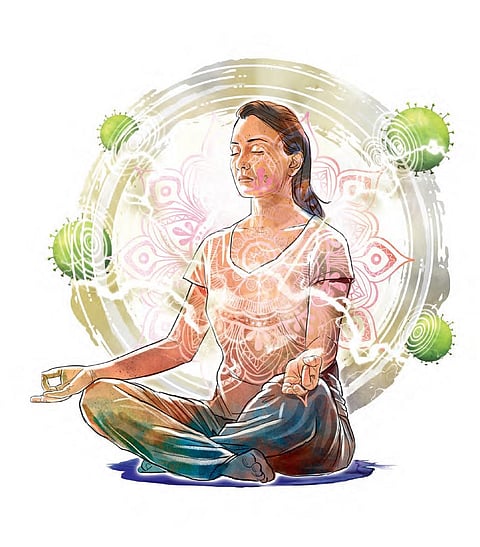

HYDERABAD: With the Coronavirus pandemic and the subsequent quarantine and lockdown, feeling stress is a normal reaction. In this state of uncertainty, even daily tasks like going out to get groceries are stressful. “The act of wearing a mask, gloves, social distancing and the constant fear that I can get affected is becoming too much to handle,” rues Anand V, a software developer living in Chandanagar.
Or perhaps you feel isolated and depressed, living away from home like Sharon P, a PG student living in Banjara Hills.
For many, the situation is no longer about stress, but one of life and death. Even getting a good night’s sleep is a difficult goal to attain because we are experiencing heightened stress and anxiety than ever before. Pratibha Agarwal, founder, director and instructor at Anahata Yoga Zone advices: “Even 15 minutes of meditation a day can alleviate underlying stress and fear.
Taking one day at a time, and living in the present can help in better sleeping patterns and reducing anxiety.” Personal yoga trainer for celebrities Tamannaah, Andrea and Nayanthara, Pratibha who is taking online classes for meditation and yoga says, “Maximum worries are centred on people worried about losing their jobs.” People across all generations are now gravitating towards meditation techniques, as they are universal and non-religious. Meditation reduces inflammation and enhances our immune functions. It also helps us focus our attention and feel less controlled by thoughts or feelings that seem challenging. The concept is that thoughts are involuntary, so accept them without judgement and then ‘let them go’.There are different types of meditation practices. These are three different techniques.
Mindfulness
Mindfulness is the basic human ability to be fully present, aware of where we are and what we are doing, and not be overly reactive or overwhelmed by what’s going on around us. “It is often defined as being present intentionally to what is unfolding in the moment non-judgmentally, with curiosity, openness, acceptance and loving kindness,” says Aarathi Selvan, a teacher of mindfulness-based symptom management from Ottawa Mindfulness Clinic, Canada.
There are both formal and informal ways to practice mindfulness. Aarathi who has 10 years of experience working in areas of mindfulness, mental health and wellness explains: “Formal practices are body scan, awareness of breath, loving kindness and compassion practices. Informal are those that allow us to pause, slow down and take stock of the present moment.” Madhur Shriyan, an architect, illustrator and hand lettering artist has been practicing mindfulness since 2016 to heal from years of ill health. She says, “along with daily meditation and breathing exercises, I included art therapy, i.e., doodling, zentangles and drawing repeat patterns. This has helped me immensely.”
Heartfulness
Heartfulness meditation is a set of practices for self-development that help find inner calm and stillness, especially in these trying times. This easily adopted practice is appropriate for people from all walks of life, cultures, religious beliefs and economic status. “The only qualification to practice heartfulness is the willingness to improve and lead a balanced life,” says Rishabh C Kothari, director, Heartfulness Institute. Why the heart? Rishabh explains, “The heart is not simply a cardiological pump! It is a profound organ, and its intrinsic nature is goodness and peace.
It is the centre of our emotional well-being. This meditation’s key outcome is to help us refer to our heart for guidance.” How is it different from mindfulness? Rishabh says, “heartfulness is mindfulness plus heart.” The practice includes meditation, cleaning and prayer. In the past few weeks, Rishabh has answered many distressed calls from people who are afraid of the future, are having fear of the unknown, fear of job loss and economic loss. He comments philosophically, “Can’t change winds, adjust your sails.”
Transcendental Meditation
TM is an effortless mental technique, which results in a deeply relaxing state of rest -- measured to be twice as deep as the deepest point of sleep. At the same time, the mind becomes calm and alert. Scientists refer to it as ‘restful alertness’. “Within a few days, it begins to spill into one’s activity, and thereby improves health, eliminates tiredness, increases focus, and strikes a better work-life balance,” says Anil G, TM initiator and TM Sidhi administrator.
It is a unique programme, a completely effortless mental method, quite different from ‘meditation’, explains Anil, who has in the last 24 years taught over 10,000 people. “It involves no concentration, no force, nor effort. It has nothing to do with religion, diet or belief”, adds he. According to Anil, stress accumulates in the nervous system. When mental activity decreases, physical activity decreases and stress dissolves, increasing immunity.
“A customised mantra depending on an individual’s concerns is given to them to recite,” says he. Fear of contracting Covid-19 is more dangerous than the actual disease, when the fear goes away, the nervous system will become strong, assures Anil. So, are the worries of the pandemic stressing you out, perhaps you are unendingly worried it might affect you or your dear ones? Or maybe you are depressed or lonely? Do you get angry and irritable easily? Or maybe you are suffering from addictions or eating disorders? Whatever your affliction (or even if you don’t have one), if peace, calm and stability in thought is what you aspire to, then give meditation a shot.
— Tamanna S Mehdi tamanna @newindianexpress.com @tamannamehdi